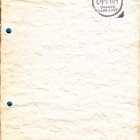Scottish Opera Collection 1996Scottish Opera
Read more about the opera Scottish Opera Collection
For Scottish Opera, the great importance of the 1996-97 season is that it saw the premiere of Inés de Castro, the first full-length opera by James MacMillan. It had been over a decade since the company had last launched a new work - Harper's Hedda Gabler in 1985. The success of the opening at the Edinburgh Festival was deserved, and it was as well received during the main autumn season. That contained six other full-scale productions: Idomeneo, Trovatore, Bohème, Fledermaus, Samson and Delilah and Cunning Little Vixen. The Opera-Go-Round small-scale tour was an enjoyable staging of Così fan tutte.
A novelty in December was this series of operatic concerts that saw the company exploring parts usually only reached by the small-scale tours. The clearest beneficiary was Dundee's Caird Hall, a vast space with well over 2000 seats and an ideal acoustic, but only receiving its third visit by Scottish Opera.
The programme opened conventionally enough, with the overture to Forza, followed by Susan McCulloch's excellent rendering of 'Tu che le vanità' from Don Carlos. The second half opened with the Gypsy Baron overture and contained Cenerentola's final rondo and the Flower Duet from Lakmé.
However the quality of the planning became obvious in the extended excerpts. The duel scene from Onegin was played complete, from Lensky's aria on, followed by the Waltz. From Tosca, we got the whole second act section from Scarpia's 'Gia mi dicon venal' through 'Vissi d'arte' to the end of the act. The Rosenkavalier sequence was inevitably a lovely performance of the final trio and duet. But Stephen Gadd was on hand to utter the single line as Faninal escorted the Marschallin to her coach. The Merry Widow extract also worked well.
This really was the kind of thing the company should do more of between the normal staged productions. The orchestra and Musical Director were seen in some very unusual places.

